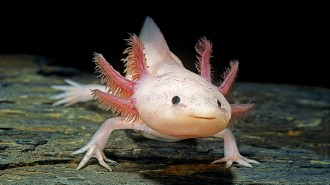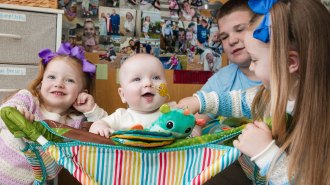It’s too soon to take coffee away from pregnant women
- More than 2 years ago
Usually when I scan new science papers, I am a reporter hunting for news. But now that I’m a mom, there’s someone else hovering over my shoulder — a hesitant new parent who asks, “Am I doing it wrong?”
This new voice rose to a ridiculous mother screech a few mornings ago when I came across a study in Science Translational Medicine. The upshot: Caffeine during pregnancy damages baby mouse brains. By the time my reporter self had a chance to catch up — What exactly changed in the brain? How much caffeine was involved? How impaired were the animals? — it was too late. New Mom had already derailed. First stop: Crazytown.
Science just told me that those lattes I savored while I was pregnant damaged my baby’s brain. And this bombshell came before I even had my morning coffee. Which, you know, damaged my sweet little baby’s brain.
Science is messy, and this paper was no exception. First, the bad news: Those baby mice did indeed have some brain abnormalities caused by their mothers drinking caffeine while pregnant and lactating. These pups had memory problems, were more prone to seizures and had fewer neurons in a memory center of the brain called the hippocampus. The mama mice weren’t guzzling 10 double espressos a day, either. Their dose was calibrated to be the equivalent of a person drinking three to four cups of coffee daily.
All of these effects seemed to stem from an underlying problem: Caffeine disturbs newborn neurons as they travel through the brain, feeling their way to their ultimate home in the hippocampus. Caffeine slows these cells down, researchers found.
I called Barry Kosofsky, a child neurologist at Weill Cornell Medical College in New York, for context, and initially, things went from bad to worse for my parenting self-esteem: The results seemed legit, he said.
What’s more, he had seen this slowed neuronal journey before. He and his colleagues found the same effect in mice, and it wasn’t caused by caffeine. It was caused by cocaine. Yes, cocaine. In an article accompanying the research paper, Kosofsky and his coauthors write that the new study raises “uncomfortable similarities between caffeine and other addictive substances.” Uncomfortable indeed.
Before my screaming mom voice drowned out the rest of our conversation, Kosofsky read my mind and was quick to point out that the results mean nothing for women. “We’re at a total loss about what to say for caffeine,” he told me (a point that made it into my story). In rodents, yes, caffeine seems to cause these persistent brain problems. But in people? “We do not have any evidence that the same thing goes on in humans,” he said.
Mouse brains and human brains are similar in lots of ways, but they are very, very different in others. Mouse brains are physically smaller and grow faster than human brains. Mice have way fewer brain cells than humans, and way fewer varieties of these cells.
And perhaps most importantly, the migration of those newborn hippocampal cells in mice and humans is really, really different. In mice, this neuron journey happens in the second half of pregnancy. In people, it happens after birth. And in people, most of these neurons are born closer to their ultimate home, meaning they never have to make a long, dangerous trip to the hippocampus. If the cells don’t take the trip, they can’t be waylaid by caffeine.
Of course, as Kosofsky said, we just don’t know what caffeine during pregnancy does to a developing human brain. It’s quite possible that coffee has a subtle effect. It’s also quite possible that it doesn’t. So for now, I’ll just have to embrace the uncertainty. Which I guess is what parenthood — and science — is all about anyway.







